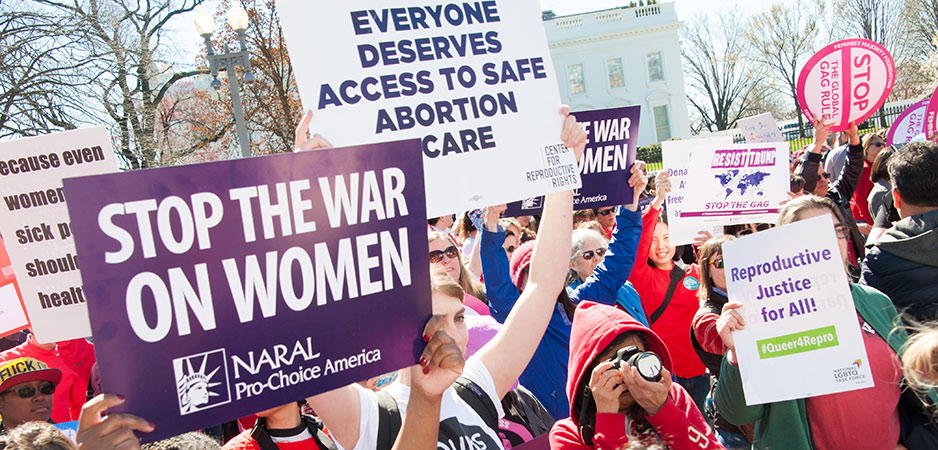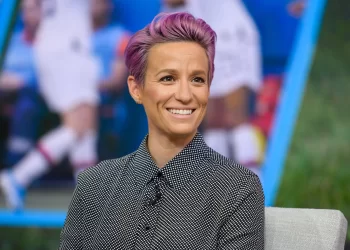By: Zachary Draves
As the Supreme Court is beginning to hear a case that can potentially wipe away reproductive rights, athletes have joined in the fray to protect nearly fifty years of progress for gender equality.
Currently the highest court in the land is set to make a decision about a Mississippi law that bans abortions after 15 weeks of pregnancy and if the law is upheld, it will essentially be the end of Roe v. Wade, the landmark 1973 decision that legalized abortion nationwide.
All this comes at a time of a vicious backlash against the fundamental right of women to choose whether to carry or terminate a pregnancy.
In September, Texas passed Senate Bill 8, which was an egregious restriction on abortion at 6 weeks which is when most women don’t even know that they are pregnant.
Furthermore, the bill gives citizens the green light to essentially to spy on other citizens in the act of “aiding and abetting” a pregnant woman seeking abortion care and receive up to $10,000 in the process.
And if things couldn’t get any worse, this bill provides no exceptions to victims of rape and incest.
Now with the Mississippi law in the hands of SCOTUS many have sounded the alarm and that has included some prominent athletes.
Back in September, a group of 500+ professional, collegiate, and Olympic athletes signed an amicus brief in support of abortion rights and they outlined the importance of reproductive freedom within the context of athletics.
Among the signatories were Megan Rapinoe, Sue Bird, Diana Taurasi, Ashleigh Johnson, Layshia Clarendon, and Crissy Perham.
They stated:
“If the state compelled women athletes to carry pregnancies to term and give birth, it could derail women’s athletic careers, academic futures, and economic livelihoods at a large scale. Such a fundamental restriction on bodily integrity and human autonomy would never be imposed on a male athlete, though he would be equally responsible for a pregnancy.”
The full amicus brief can be found here: https://www.supremecourt.gov/DocketPDF/19/19-1392/193017/20210920155533026_19-1392%20Amici%20Curiae.pdf
If women athletes aren’t able to have the full range of access to reproductive health services, it will hurt the future of women’s sports.
The renowned sports sociologist and civil rights activist Dr. Harry Edwards has spoken in recent years about this trend.
According to Dr. Edwards, states like Texas and North Carolina has seen a decrease in women’s participation in sports at the same that anti-abortion laws were passed and reproductive health clinics began to close down.
That is not a coincidence.
When looking at history, we often talk about the clear impact Title IX has had on gender equality, but we don’t talk enough about Roe v. Wade.
Essentially, the Supreme Courts’ decision in 1973 gave colleges/universities the confidence that they could give young women athletic scholarships and ensure that she would be available to fully participate throughout their respective athletic seasons without inference.
In other words, when women are given access to health care and sports, they become active functioning members of society.
In a scenario where a female athlete finds out she is pregnant, but can’t carry the child for academic, financial, and/or athletic reasons and learns that she has no access to clinics or abortion service providers, her future is compromised.
Or if she does carry the child to term, but has no access to affordable child care or her university won’t make arrangements for her to take classes and be at practice at reasonable times, her future is compromised.
So if we put this in full context in the present time, reproductive rights are being stripped, Title IX is under siege, we don’t have a national system of child care compared to the rest of the industrialized world, we don’t have national paid parental leave, ultimately we will see a sharp decrease in women receiving athletic and academic scholarships and women who are survivors of sexual assault being robbed of safeguards and protections.
We could see an overall negative impact on women’s participation in sports if SCOTUS upholds this law.
We also have to take it to account the impact this outcome can have on historically marginalized populations.
Maya Satya Reddy, a former pro golfer, law student at the University of Penn , Athlete Ally Ambassador, and one of the signatories of the amicus brief expressed that concern particularly at that intersection of reproductive rights and the current struggle over transgender rights.
“Abortion access and rights to abortion don’t just impact pregnant people or people with uteruses” she said.
“When you are restricting a person’s choices in that way you are also creating groundwork to restrict every single type of reproductive health care or health care in general which society deems superfluous and elective such as trans lifesaving health care or gender affirmation surgery.”
In other words, you can’t address one without addressing the other and it is extremely dystopic for the state to determine which types of health care are worthy of access.
There is also a long history of the bodies of black women and other women of color being overtly regulated, policed, and restricted dating back to the days of slavery and in the present day these types of laws that essentially repeat that pattern will have a disproportionate effect.
According to the Black Women’s Health Imperative:
“Policies that restrict access to safe and legal abortions disproportionately affect Black women, particularly those who are low income. Black women are often targeted by anti-abortion campaigns that use thinly-veiled racism and sexism to shame those who use abortion services. This is true despite the fact that Black women account only for 39 percent of all legal abortions, as compared to 51 percent among White women, according to the most recent data.”
https://www.bwhi.org/wp-content/uploads/2018/09/BWHI_HealthAgenda_v13_Final_LoRes.pdf
As a result, this intersectional issue requires an intersectional response.
If there is any good to take away from this, it is that women and men of good will and conscious are standing up and not taking this lying down which has has found its place in the world of sports.
The outcry is palpable and the need to do something is urgent.
The fight against sexism, misogyny, and the policing of women’s bodies requires us all, especially those with privilege, to step up.
When we achieve true equity and fairness, we can then say we have come a long way baby.


 NFL
NFL





